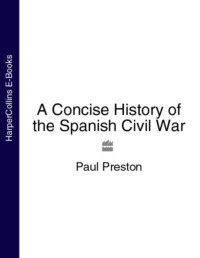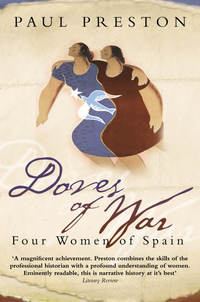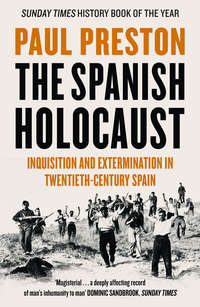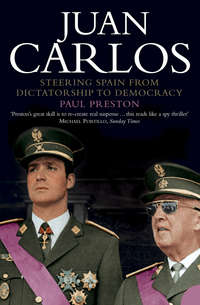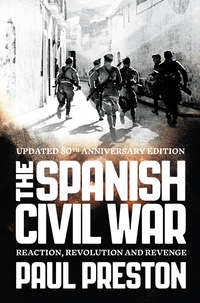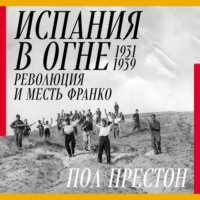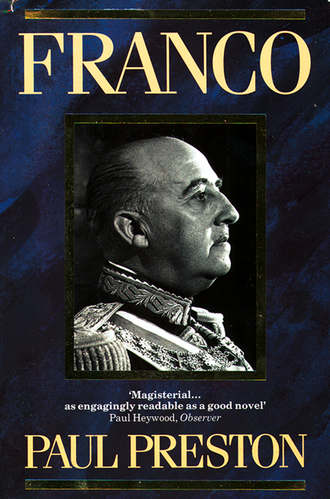
Полная версия
Franco
Franco, always rigidly in favour of the severest penalties for mutiny and of the strictest application of military justice, believed that Gil Robles was totally mistaken. He told the Italian Chargé d’Affaires, Geisser Celesia, ‘The victory is ours and not to apply exemplary punishments to the rebels, not to castigate energetically those who have encouraged the revolution and have caused so many casualties among the troops, would signify trampling on the just rights of the military class and encourage an early extremist response.’43 The fact that pardons were eventually granted would contribute in 1936 to Franco’s decision to take part in the military uprising which opened the Civil War.
In 1934, however, Franco was hostile to any military intervention in politics. His part in suppressing the Asturian insurrection had left him satisfied that a conservative Republic ready to use his services could keep the Left at bay. Not all his comrades-in-arms shared his complacency. Fanjul and Goded were discussing with senior CEDA figures the possibility of a military coup to forestall the commutation of the death sentences. Gil Robles told them through an intermediary that the CEDA would not oppose a coup. It was agreed that they would consult other generals and the commanders of key garrisons to see if it might be possible ‘to put Alcalá Zamora over the frontier’. After checking with Franco and others, they concluded that they did not have the support necessary for a coup.44
Franco exercised a similarly restraining influence over other would-be rebels. In late October, Jorge Vigón and Colonel Valentín Galarza believed that the moment had come to launch the military rising which they had been preparing since the autumn of 1932. Their plan was for the monarchist aviator, Juan Antonio Ansaldo, to fly to Portugal, pick up Sanjurjo and take him to the outskirts of Oviedo where he would link up with Yagüe. It was assumed that together Sanjurjo and Yagüe would easily persuade the bulk of the Army to join them in rebellion against the Republic. While the conspirators waited in the home of Pedro Saínz Rodríguez for the order to proceed, the journalist Juan Pujol arrived to say that he had spoken with Franco at the Ministry of War and Franco believed that it was not the right moment.45 Enjoying considerable power and confident of his ability to use it decisively against the Left, he had no reason to want to risk his career in an ill-prepared coup. The fact that other prominent officers now deferred to his views, as they had not in 1932, was a measure of the dramatic increase in prestige bestowed upon him by the events in Asturias.
Although delighted with the repression of the Asturian rising, Gil Robles sought to strengthen his own political position and so he joined Calvo Sotelo in deriding the Radical government for weakness. Diego Hidalgo was one of the sacrificial victims.46 Accordingly, from 16 November 1934 to 3 April 1935, the Prime Minister, Alejandro Lerroux, himself took over the Ministry of War. He awarded Franco the Gran Cruz de Mérito Militar and kept him in his extraordinary post of ministerial adviser until February 1935. Lerroux had intended to reward Franco by making him High Commissioner in Morocco but was prevented from doing so by the opposition of Alcalá Zamora.47 Instead, he kept on the existing civilian High Commissioner, the conservative Republican Manuel Rico Avello, and made Franco Commander-in-Chief of the Spanish Armed Forces in Morocco.
Despite any disappointment that he might have felt at not being made High Commissioner, being an Africanista, Franco perceived the post of head of the African Army as a substantial reward for his work in repressing the revolution. As he put it himself, ‘the Moroccan Army constituted the most important military command’.48 On arrival, he hastened to inform the Entente Internationale contre la Troisième Internationale of his change of address.49 Although he was to be there barely three months, it was a period which he enjoyed immensely. As Commander-in-Chief, he consolidated his existing influence within the armed forces in Morocco and established new and important contacts which were to facilitate his intervention at the beginning of the Civil War. His relationship with Rico Avello was similar in many respects to that which he had enjoyed with Diego Hidalgo. The High Commissioner, recognizing his own ignorance of Moroccan affairs, relied on Franco for advice of all kinds. Franco also established an excellent working relationship with the Chief of the General Staff of the Spanish forces in Morocco, Colonel Francisco Martín Moreno. This was to be crucial in 1936.50
On the road to civil war, there could be no going back from the events of October 1934. The Asturian rising had frightened the middle and upper classes. Equally, the vengeful repression urged by the Right and carried out by the Radical-CEDA coalition convinced many on the Left that electoral disunity must never be risked again. The publicity given to Franco’s role in the military repression of the uprising ensured that thereafter he would be regarded as a potential saviour by the Right and as an enemy by the Left. Franco himself was to draw certain conclusions from the Asturian uprising. Convinced by the material received from Geneva that a Communist assault on Spain was being planned, he saw the events of October 1934 in those terms. He was determined that the Left should never be allowed to enjoy power even if won democratically.51
Nothing was done by successive conservative governments in the fifteen months after October 1934 to eliminate the hatreds aroused by the revolution itself or by its brutal repression. The CEDA claimed that it would remove the need for revolution by a programme of moderate land and tax reforms. Even if this claim was sincere in the mouths of the party’s few convinced social Catholics, the limited reforms proposed were blocked by right-wing intransigence from the majority. Thousands of political prisoners remained in jail; the Catalan autonomy statute was suspended and a vicious smear campaign was waged against Azaña in a vain effort to prove him guilty of preparing the Catalan revolution. Azaña was thereby converted into a symbol for all those who suffered from the repression.52
The CEDA made a significant advance towards its goal of the legal introduction of an authoritarian corporative state on 6 May 1935 when five Cedistas, including the Jefe himself as Minister of War, entered a new cabinet under Lerroux. Gil Robles appointed known opponents of the regime to high positions – Franco was recalled from Morocco to become Chief of the General Staff; Goded became Inspector General and Director of the Air Force, and Fanjul became Under-Secretary of War. The President, Alcalá Zamora, was hostile to the appointment of Franco, regularly remarking that ‘young generals aspire to be fascist caudillos’. Eventually, threats of resignation from both Lerroux and Gil Robles overcame the President’s opposition.53 There was a fierce rivalry and mutual dislike between Franco and Goded. Goded had wanted the job of Chief of the General Staff and was heard to comment bitterly that he awaited the failure of Franco.54
Franco in mid-1935 was still some way from thinking in terms of military intervention against the Republic. Indeed, it would be wrong to assume that he spent much time thinking about overthrowing the Republic. As long as he had a posting which he considered to be appropriate to his merits, he was usually content to get on with his job in a professional manner. He had been extremely happy during his three months in Morocco and, while sad to leave an interesting job, he was thrilled by this even more important posting. In his new post, able to carry on the job which he had done in October, he can have felt little urge or need to rebel at this time. In any case, he remained deeply influenced by the failure of Sanjurjo’s coup of 10 August 1932. Moreover, given the ease of his relationship with Gil Robles, his day-to-day work gave him enormous satisfaction.55
As Chief of Staff, Franco worked long hours to fulfil his central task which he saw as being to ‘correct the reforms of Azaña and return to the components of the armed forces the internal satisfaction which had been lost with the coming of the Republic’. He neglected his family, obsessively working until late at night, at weekends and on holidays.56 Azaña’s revisions of promotions by merit were set aside. Many loyal Republican officers were purged and removed from their posts, because of their ‘undesirable ideology’. Others, of known hostility to the Republic, were reinstated and promoted. Emilio Mola was made General in command of Melilla and shortly afterwards head of military forces in Morocco. José Enrique Varela was promoted to general. Medals and promotions were distributed to those who had excelled in the repression of the October uprising.57 Gil Robles and Franco had secretly brought Mola to Madrid to prepare detailed plans for the use of the colonial Army in mainland Spain in the event of further left-wing unrest.58
Alcalá Zamora remained deeply suspicious of Gil Robles’ political motives in fostering the careers of anti-Republican officers and in trying to transfer control of the Civil Guard and the police from the Ministry of the Interior to the Ministry of War. In some ways – regimental reorganization, motorization, equipment procurement – Gil Robles continued the reforms of Azaña.59 The CEDA-Radical government was anxious for the Army to re-equip to ensure its efficacy in the event of having to face another left-wing rising. As Chief of Staff, Franco was involved in establishing contacts with arms manufacturers in Germany as part of the projected rearmament.60 There can be little doubt that he enjoyed his new job as much as he had liked being Director of the Military Academy in Zaragoza. Despite the later deterioration of their relationship after 1936, he and Gil Robles worked well together in a spirit of co-operation and mutual admiration. Like Diego Hidalgo and Manuel Rico Avello, Gil Robles recognized his own ignorance in military affairs and was happy to leave Franco to get on with things. Franco looked back on his period as Chief of the General Staff with great satisfaction because his achievements facilitated the later Nationalist war effort.61
After earlier doubts, in the late summer of 1935, Franco made contact, through Colonel Valentín Galarza, with the Unión Militar Española, the extreme rightist conspiratorial organization run by his one-time subordinate Captain Bartolomé Barba Hernández. Galarza, who organized UME liaison between the various garrisons across the country, kept Franco informed about the morale and readiness of the organization’s members. In retrospect, Franco saw his approach to the UME as being to prevent it ‘organizing a premature coup along the lines of a nineteenth century pronunciamiento’.62 It is entirely in character that he would want any military action in which he might be involved to be fully prepared.
On 12 October 1935, Don Juan de Borbón, the son of Alfonso XIII, married in Rome. It was to be an excuse for monarchists, among them the plotters of Acción Española, such as José Calvo Sotelo, Jorge Vigón, Eugenio Vegas Latapie, Juan Antonio Ansaldo, to travel en masse to Italy. Franco was not among their number. Nevertheless, he did contribute to the wedding present given by the officers who had once been gentilhombres of Alfonso XIII.63
Franco’s readiness to make contact with the UME reflected his concern at the fact that, despite the strength of the repression, the organized Left was growing in strength, unity and belligerence. The economic misery of large numbers of peasants and workers, the savage persecution of the October rebels and the attacks on Manuel Azaña combined to produce an atmosphere of solidarity among all sections of the Left. A series of gigantic mass meetings were addressed by Azaña in the second half of 1935 and the enthusiasm for unity shown by the hundreds of thousands who attended them helped clinch mass enthusiasm for what became the Popular Front.
The tiny Spanish Communist Party joined the Popular Front, an electoral coalition which, contrary to rightist propaganda and the material sent to Franco by the Entente contre la Troisième Internationale of Geneva, was not a Comintern creation but the revival of the 1931 Republican-Socialist coalition. The Left and centre Left joined together on the basis of a programme of amnesty for prisoners, of basic social and educational reform and trade union freedom. However, Comintern approval of the Popular Front strategy, ratified at its VII Congress on 2 August 1935, was used by the Entente to convince its subscribers, including Franco, that Moscow planned a revolution in Spain.64
Gil Robles’ tactic of gradually breaking up successive Radical cabinets was overtaken in the autumn by the revelation of two massive financial scandals involving followers of Lerroux. In mid-September, Alcalá Zamora invited the dour conservative Republican, Joaquin Chapaprieta, to form a government. With the Radical Party on the verge of disintegration, Gil Robles provoked the resignation of Chapaprieta on 9 December in the belief that he would be asked to form a government. Alcalá Zamora, however, had no faith in Gil Robles’s commitment to the Republic. Instead, when he spoke with the President on 11 December, Gil Robles learned with rage that he was not being asked to be prime minister. Alcalá Zamora pointed out that the degree of government instability demonstrated the need for new elections. Gil Robles could hardly argue that it would now stop since he had provoked that instability in order to pave the way to firm government by himself. He had overplayed his hand. The President was so suspicious of Gil Robles that, throughout the subsequent political crisis, he had the Ministry of War surrounded by Civil Guards and the principal garrisons and airports placed under special vigilance.65
The only choice now open to Gil Robles was to patch together some compromise which would enable the CEDA to avoid elections and thus carry on in the government or else arrange a coup d’état. He tried both options simultaneously. On the same evening a messenger was sent to Cambó, head of the Catalan Lliga, to ask him to join the CEDA and the Radicals in a coalition government. Cambó refused. Meanwhile, in the Ministry of War, Gil Robles was discussing the situation with Fanjul. Fanjul claimed enthusiastically that he and General Varela were prepared to bring the troops of the Madrid garrison onto the streets that very night to prevent the President from going through with his plans to dissolve the Cortes. There were plenty of officers only too willing to join them, especially if a coup had the blessing of the Minister of War and could therefore be seen as an order. However, Gil Robles was worried that such an action might fail, since it would certainly face the resistance of the Socialist and anarchist masses. Nevertheless, he told Fanjul that, if the Army felt that its duty lay in a coup, he would not stand in its way and, indeed, would do all that he could to maintain the continuity of government while it took place. Only practical doubts held him back and so he suggested that Fanjul check the opinion of Franco and other generals before making a definite decision. He then passed a sleepless night while Fanjul, Varela, Goded and Franco weighed up the chances of success. All were aware of the problem presented by the fact that there was every likelihood that the Civil Guard and the police would oppose a coup.66
Calvo Sotelo, confined to bed with a fierce attack of sciatica, also sent Juan Antonio Ansaldo to see Franco, Goded and Fanjul to urge them to make a coup against the plans of Alcalá Zamora. Franco, however, convinced his comrades that, in the light of the strength of working class resistance during the Asturian events, the Army was not yet ready for a coup.67 When the young monarchist plotter, the Conde de los Andes, telephoned Madrid from Biarritz to hear the details of the expected coup, Ansaldo replied ‘The usual generals, and especially the gallego, say that they cannot answer for their people and that the moment has not yet arrived’.68 The government of Joaquin Chapaprieta was replaced by the interim cabinet of Manuel Portela Valladares. Thus, on 12 December, Gil Robles was obliged to abandon the Ministry of War with ‘infinite bitterness’. When the staff of the Ministry said goodbye to Gil Robles on 14 December, a tearful Franco made a short speech in which he declared ‘the Army has never felt itself better led than in this period.69
In response to the move towards a more liberal cabinet, José Antonio Primo de Rivera sent his lieutenant Raimundo Fernández Cuesta to Toledo on 27 December with a wild proposal to Colonel José Moscardó, military governor and Director of the Escuela Central de Gimnasia (Central School of Physical Education) there. The suggestion was that several hundred Falangist militants would join the cadets in the Alcázar of Toledo to launch a coup. Common sense should have told Moscardó that it was a ridiculous idea. However, he felt that he could not make a decision without discussing it first with Franco. Leaving Fernández Cuesta waiting in Toledo, he drove to Madrid and consulted with the Chief of the General Staff who, as could have been foreseen, told him that the scheme was impracticable and badly timed.70
Franco made it clear that he resented these initiatives from civilians as attempts to take advantage of the ‘most distinguished officers’ for their own partisan purposes. Moscardó was one of a number of officers, to whom he referred as ‘simplistic comrades’, who brought such proposals to him. He told them all that to precipitate matters was to guarantee failure. The job of the Army was to maintain its unity and discipline to be ready to intervene if and when the Republic proved itself totally unviable. What the Army could not do was to try to destroy the Republic before the population was ready.71 After Gil Robles was replaced as Minister of War by General Nicolás Molero, Franco was left as Chief of the General Staff. Like his predecessor, Molero was happy for Franco to get on with a job which he did well. Franco wrote to a friend on 14 January 1936, ‘I am still here in my post and I don’t think they’ll move me’. His contentment, along with his natural caution, may well have contributed to his inclination against conspiratorial adventures.72
The elections were scheduled for 16 February 1936. Throughout January, rumours of a military coup involving Franco were so insistent that, late one night, the interim prime minister Manuel Portela Valladares sent the Director-General de Seguridad, Vicente Santiago, to the Ministry of War to see Franco and clarify the situation. The Chief of the General Staff was clearly still in the same cautious mood in which he had greeted Moscardó a few days earlier. Nevertheless, there was a double-edge in his reply. ‘The rumours are completely false; I am not conspiring and I will not conspire as long as there is no danger of Communism in Spain; and to put your mind at rest even more, I give you my word of honour, with all the guarantees that this carries between comrades in arms. While you are in the Dirección General de Seguridad, I have complete confidence that law and order, which is of such importance to all Spaniards and above all to the Army, will not be overthrown. Our job is to co-operate.’ The Director-General de Seguridad then said something which was uncannily prophetic: ‘If you and your comrades at any time feel that the circumstances which you mention come about and you are pushed to a rising, I dare say that if you don’t win in forty-eight hours there will follow misfortunes the like of which were never seen in Spain or in any revolution.’ Franco replied ‘We will not make the same mistake as Primo de Rivera in putting the Army in charge of the government’.73 That Franco should discount the possibility of military government after a coup reflected his recent discussions with Goded and Fanjul about the plan to put Gil Robles in power, a plan rejected as unsafe.
Inevitably, the election campaign was fought in an atmosphere of violent struggle. In propaganda terms, the Right enjoyed an enormous advantage. Rightist electoral funds dramatically exceeded those of the poverty-stricken Left, although Franco was to remain convinced that the reverse was the case. He believed that the Left was awash with gold sent from Moscow and money stolen by the revolutionaries in October 1934.74 Ten thousand posters and 50 million leaflets were printed for the CEDA. They presented the elections in terms of a life-or-death struggle between good and evil, survival and destruction. The Popular Front based its campaign on the threat of fascism and the need for an amnesty for the prisoners of October.
In fact, Franco was absent from Spain during part of the election campaign, attending the funeral of George V in London. He was chosen to attend because he was Chief of Staff and because he had once served in the Eighth Infantry Regiment of which the King of England was Honorary Colonel. He attended the funeral service at Westminster Abbey on Wednesday 28 January and, along with other foreign dignitaries, accompanied the coffin to its final resting place in St George’s Chapel, Windsor.75 On the return journey by cross-channel ferry, Franco made some significant remarks to Major Antonio Barroso, the Spanish military attaché in Paris, who had accompanied him on the trip. He told Barroso that the Popular Front was the direct creation of the Comintern and was intended as a Trojan Horse to introduce Communism into Spain. He said that Mola and Goded were equally worried and everything now hinged on what the Popular Front did if it won the elections. The Army had to be ready to intervene if necessary.76
The Chief of the General Staff returned to Madrid on 5 February. Franco’s instinctive caution was to the fore during a meeting that he held with José Antonio Primo de Rivera, at the home of Ramón Serrano Suñer’s father and brothers, just before the elections in mid-February. The leader of the Falange was obsessed with the need for a military intervention of surgical precision as a prelude to the creation of a national government to stop the slide into revolution. In fact, despite a seductive charm which made him the darling of Spanish high society, the young fascist leader had never attracted or impressed Franco, who, at this meeting, was evasive, rambling and cautious. Almost certainly, at the back of his mind was the madcap scheme which José Antonio Primo de Rivera had recently put to Colonel Moscardó. Franco was not about to become the accomplice in conspiracy of a young Falangist leader whom he did not respect and who had little popular support. Rather than get to the point of the meeting, he chatted aimlessly. José Antonio was deeply disillusioned and irritated, saying ‘my father for all his defects, for all his political disorientation, was something else altogether. He had humanity, decisiveness and nobility. But these people …’.77
The elections held on 16 February resulted in a narrow victory for the Popular Front in terms of votes, but a massive triumph in terms of seats in the Cortes.78 In the early hours of the morning of 17 February, as the first results were coming in, the popular enthusiasm of the masses was sending panic through right-wing circles. Franco and Gil Robles, in a co-ordinated fashion, worked tirelessly to hold back the decision of the ballot boxes. The main target of their efforts was the Prime Minister (who was also Minister of the Interior). Gil Robles and Franco both saw clearly that it was crucial to persuade him to stay on in order to ensure that the Civil Guard and the crack police units (the Guardias de Asalto) would not oppose the Army’s measures to reimpose ‘order’.
At about 3.15 a.m. on 17 February, Gil Robles presented himself at the Ministerio de la Gobernación and asked to see Portela. The CEDA leader was outraged to discover that Portela had gone to his rooms at the Hotel Palace. Portela was woken to be told that Gil Robles was waiting to see him. Three quarters of an hour later, the Prime Minister arrived. Gil Robles, claiming to speak in the name of all the forces of the right, told him that the Popular Front successes meant violence and anarchy and asked him to declare martial law. Portela replied that his job had been to preside over the elections and no more. He was, nevertheless, sufficiently convinced by Gil Robles to agree to declare a State of Alert (a stage prior to martial law) and to telephone Alcalá Zamora and ask him to authorize decrees suspending constitutional guarantees and imposing martial law.79


